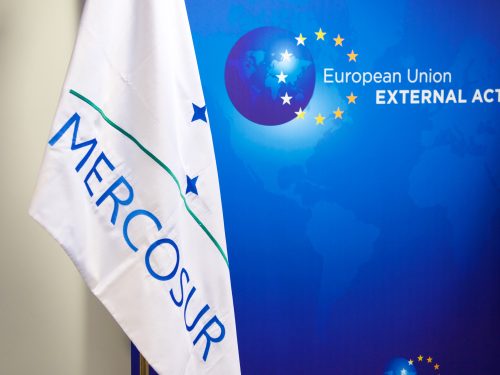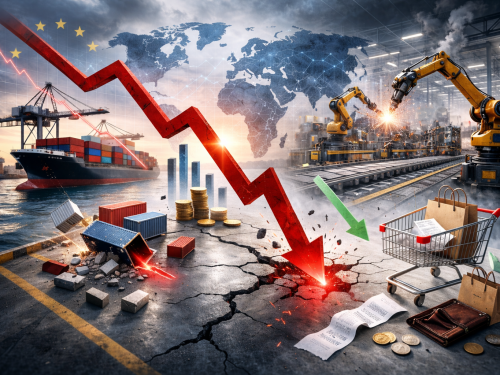News
Share on
"We will have to evaluate very carefully the duties that Trump will announce. For Italy the risk is there, and our Study Centre is quantifying the impact, which will be massive,' said the President of Confindustria, Emanuele Orsiniin an interview with the newspaper The Press. "Italy on the export front owes its double-digit growth in the post-Covid period largely to the increase of our share in the US. The sectors that are most exposed today," he added, "are precisely those that have exported the most: pharmaceuticals, foodstuffs, and production machinery in addition to textiles-fashion.
According to President Orsini " Europe has two categorical imperatives: dialogue with everyone, starting with the new US administration, and avoid gut reactions that are counterproductive'. Indeed, 'if Europe fuels the clash with the US, only China will benefit'. He then indicated the things to be done immediately: 'speed up the cut in rates by the ECB because it would depreciate the euro by cushioning the effect of US tariffs. Then new trade agreements with Mexico, India, Japan, Thailand, Vietnam as a shield to the tariff war must be defined and then the treaty with the Mercorsur South America. Finally, the European single market must be improved to facilitate and increase intra-EU trade'.
Italian and European institutions must 'play all possible cards,' the Confindustria leader added. Europe must remain united and anyone who has good relations with the US administration must activate them for the common good. We and Germany are the countries most exposed to the US and that is also why we are working with the president of the German Confindustria to actively relaunch European industrial policies'.
'Italian companies have performed miracles with record exports, despite 24 consecutive months of declining production. The hypothesis to be averted is that our entrepreneurs will really start to consider relocating production outside our country, also because of the choices made in Europe by the previous commission,' warned Orsini, reiterating the need for 'an answer in terms of productivity and competitiveness. Two negative European examples are the cost of energy and the weight of bureaucracy, deadly ballasts for entrepreneurs and expansionist policies. That is why we strongly call for a single European energy market'.
'The car and all energy-intensive sectors are losing competitiveness because of the choices made on CO2 and ETS, energy costs, over-regulation of industry with enormous costs for companies,' he added. All the European manufacturing confederations are fighting for the new Commission to understand that new and immediate choices are needed to reverse this drift. The entire model of European social cohesion is at stake. I repeat, we must act now'.
Asked what he wants from the government in view of the Def, Orsini said: we need to 'implement a real industrial plan with a multi-year horizon, without waiting for the deadlines of budget laws. Resources that have not been spent must be redirected as soon as possible, such as for Industria 5.0, which is too difficult to implement. Speed up the NRP and support the extensions announced yesterday by Commissioner Fitto, but above all define a series of interventions for the most exposed industrial sectors; investing in Invitalia's development contracts, a potential driver of virtuous growth. Italy, like Germany, must therefore launch a major industrial plan to overcome its crisis by putting industry at the centre'.
"We are happy to have succeeded in bringing back pragmatism and avoiding inconvenience and confusion for companies" even if "there are still many unresolved points, we must work to improve the law," added Orsini on the measure of catastrophic policies, while on the Bill Decree "These are time-bound measures. What industry needs are structural measures: on the one hand through corrections in Europe of the mistakes made, and on the other hand through increasing quotas of energy at a capped price and certain quantities to be reserved for energy-intensive sectors. And then we must watch out for the speculation that dominates the gas market and almost triples the price of electricity. It is madness that a few unsupervised companies in Europe can speculate behind the backs of European households and businesses'.
Infine, sui temi del lavoro e nel dialogo coi sindacati Orsini ha concluso: “Non manca la buona volontà, serve pragmatismo dai due lati del tavolo. In primis i contratti non rinnovati sono soprattutto nei servizi e nella Pa. Nel nostro sistema solo il 5,3% dei lavoratori ha ritardi contrattuali di oltre 24 mesi. Dovremmo, inoltre, considerare un altro fenomeno importante: le aziende non stanno licenziando nonostante il calo della produzione. I dati del nostro Csc dicono che il 34,8%delle nostre aziende, ovvero oltre una ogni tre, mantiene i livelli occupazionali nonostante un calo della produttività. Per questo dico dovremmo chiedere insieme ai sindacati un piano di politica industriale e quindi sociale da attuare subito. E, punto fondamentale, dobbiamo lavorare insieme per intervenire su formazione e prevenzione per evitare gli incidenti sul lavoro”.




